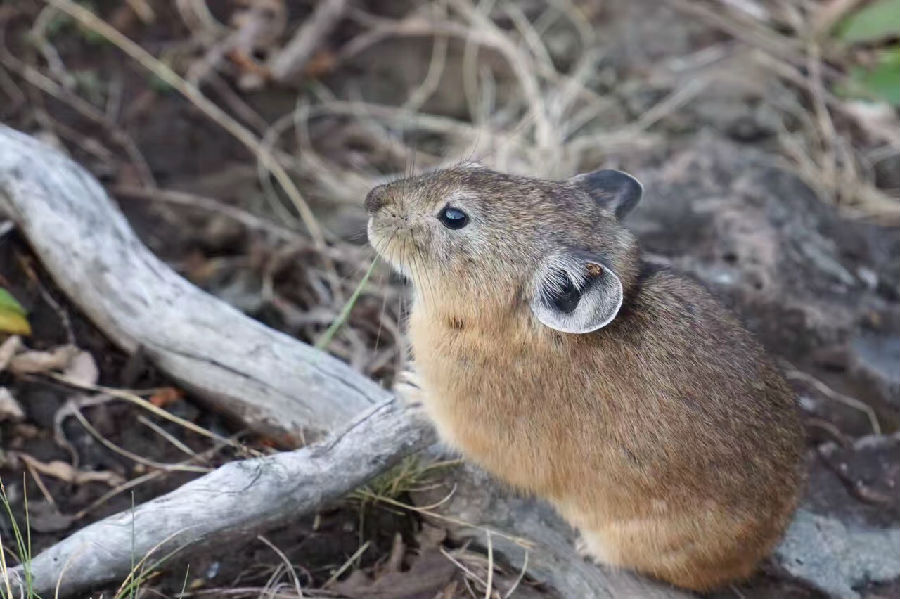(单词翻译:单击)
听力文本
This is Scientific American — 60-Second Science. I'm Christopher Intagliata.
Up in California's High Sierra, above the dense pine forests, rocky habitats reign. And if you look carefully among the boulders, you might see a pika—a rabbit relative the size of a hamster, with round ears and big eyes.
"Hikers oftentimes see them with little bouquets of wildflowers sticking out of their mouths. They run back to their home to cache them in hay-pile." Joseph Stewart, a conservation biologist at the University of California Santa Cruz. "Maybe I'm a little biased, other people tell me they're very cute, um, I disagree. I find them majestic. I feel like they're the lords of the mountain."
Stewart is also a skilled spotter of pikas. "You could say I've got a little bit of experience with that." Which makes it all the more strange that in five years of surveys—of 64 square miles of high mountain rocky habitats near Lake Tahoe—he found no pikas at all. In an area littered with decades-old pika droppings.

It's relatively pristine habitat, in the center, rather than the edge, of historic pika territory. So Stewart suspects the most likely culprit for this local extinction is rising temperatures, due to climate change. And the mercury's heading higher. "By 2050 we expect there's going to be a 97 percent decline in the area of climatically suitable habitat in the greater Tahoe area." The study is in the journal PLOS ONE.
Pikas can still be seen elsewhere in Tahoe, and in other parts of the Sierras Nevada. Especially further south, where loftier summits allow pikas to roam higher to escape rising temperatures. But Stewart still worries about their eventual fate.
"Yeah, we're depriving future generations of the opportunity to see this critter. And pikas have been around longer than humans have been around. What right do we have to cause pikas and all the other species that are vulnerable to climate change to go extinct?"
Thanks for listening for Scientific American — 60-Second Science Science. I'm Christopher Intagliata.
参考译文
这里是科学美国人——60秒科学。我是克里斯托弗·因塔利亚塔。
在加利福尼亚州高山之巅、茂密的松树林之上,有一片岩石区。如果你仔细观察,你会在岩石中间发现鼠兔——这是一种和仓鼠差不多大的兔子,它有着圆圆的耳朵和大大的眼睛。
“徒步者们常常看到它们嘴里叼着几束野花。它们跑回家后会把野花藏在干草堆里。”加州大学圣克鲁斯分校的保护生物学家约瑟夫·斯图尔特说道。“也许我对鼠免有点偏见,其他人都跟我说它们很可爱,可是我有不同的看法。我发现它们很有威严。我觉得它们像山中之王。”
斯图尔特还是一名经验丰富的鼠兔观察员。“可以说我在这方面有些经验。”而他的这些经验令这件事更加奇怪——他在塔霍湖周围64平方英里的高山岩区做了5年调查,可是一只鼠兔都没发现过。而那里遍布着几十年前的鼠兔粪便。
那是一个相对原始的栖息地,是历史上鼠兔领地的中心,而非边缘。因此,斯图尔特怀疑导致该地鼠兔灭绝的罪魁祸首是气候变化引起的气温上升。气温表的汞柱一直飙升。“据我们预计,到2050年泛塔霍湖地区中气候适宜的栖息地将会减少97%。”这项研究结果发表在《公共科学图书馆·综合》期刊上。
在塔霍湖其他地区以及寒拉斯山脉其他地区还能看到鼠兔。尤其是更靠南的地区,那里山峰更高,使鼠兔可以前往更高处躲避高温。但是斯图尔特依然对鼠兔的最终命运感到担心。
“是的,我们正在剥夺后代看到鼠兔的机会。鼠兔存在的时间比人类还要久远。我们有什么权利让鼠兔及其他容易受气候变化影响的物种走向灭绝呢?”
谢谢大家收听科学美国人——60秒科学。我是克里斯托弗·因塔利亚塔。
译文为可可英语翻译,未经授权请勿转载!
重点讲解
重点讲解:
1. be littered with 充满的;
例句:The living-room floor was littered with filth and tin cans.
客厅地上丢满了脏东西和罐头听。
2. rather than 而非;胜于;而不是;
例句:The zoo needed better management rather than more money.
这座动物园需要更好的管理,而不是更多的资金。
3. deprive of 剥夺;使丧失;使不能享有;
例句:Our children also depend on Earth's natural resources and we should not deprive them of such necessities.
我们的孩子同样需要自然资源,我们不能剥夺他们的这份必需品。
4. be vulnerable to 易受伤害的;易受影响的;
例句:Children's developing brains and tissues are thought to be most vulnerable to cellphone radiation.
孩子发育中的大脑和组织被认为是最容易受手机辐射影响的。


